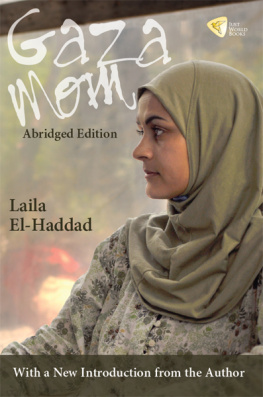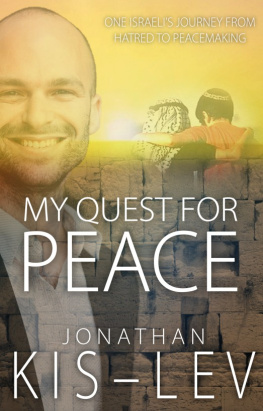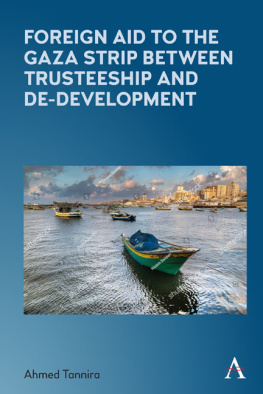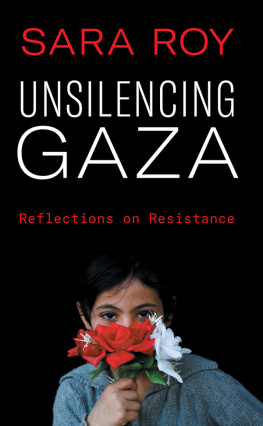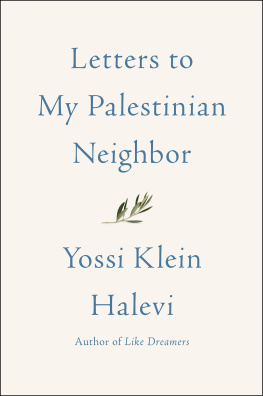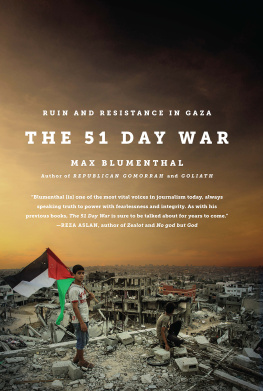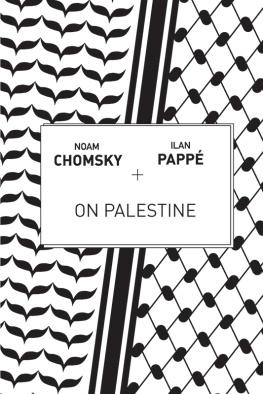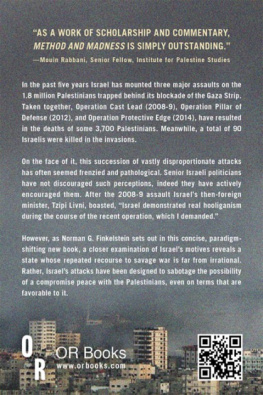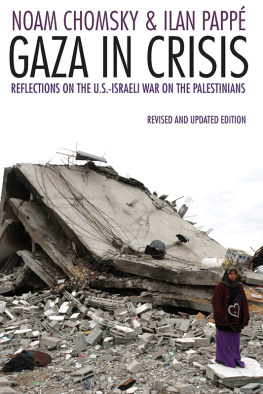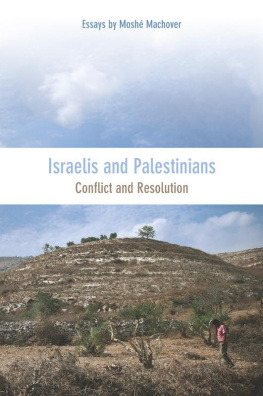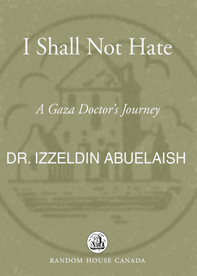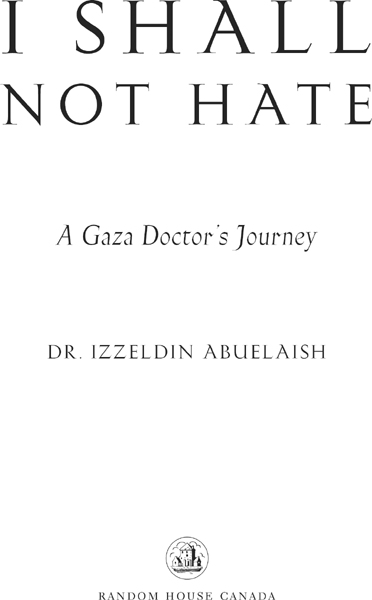Contents
ONE
TWO
THREE
FOUR
FIVE
SIX
SEVEN
Foreword by Sally Armstrong
I ZZELDIN ABUELAISH IS A PALESTINIAN doctor who was born and raised in the Jabalia refugee camp on the Gaza Strip. An obstetrician/gynecologist who specializes in infertility treatment, he lives in Gaza but has worked in Israel for much of his adult life. He is also a Harvard-trained public health expert whose opinions and research are sought throughout the world. He is presently an associate professor at the Dalla Lana School of Public Health at the University of Toronto.
But its in the strip of land he calls homea place others call the biggest concentration camp in the world, where 1.5 million Gazans are crammed into 360 square kilometres of landwhere he has developed a reputation as the doctor with the prescription for the Middle East. He has been crossing the line in the sand between Israelis and Palestinians for most of his life: as a physician who treats patients on both sides of the boundary; as a humanitarian who sees the need for improved health and education for adolescent girls and women as the way forward for the troubled region; and most recently, as the father whose daughters were killed by Israeli shells during the Gaza incursion on January 16, 2009. His response to this tragedy catapulted Izzeldin Abuelaish directly into the hearts and minds of people around the world, and especially in Israel. He didnt seek revenge or resort to hatred. Instead he said, Let my daughters be the last to die, and called for the people in the region to start talking to each other and act.
The immediate aftermath of the tragedy was covered live on Israeli television; within twenty-four hours, millions of television and YouTube viewers and bloggers knew of the Gaza doctor. Abuelaish has received many humanitarian awards and is in the process of starting a foundation in honour of his daughtersa foundation, he says, that will empower the women and girls of the Middle East through health and education.
His life story, which he tells here for the first time, is the chronicle of the Middle East through the eyes of one man who has lived the triumphs and tragedies of one of the most confounding places on the planet.
Sally Armstrong
Introduction by Dr. Marek Glezerman
I N THE EARLY NINETIES, WHEN I was chair of the obstetrics and gynecology department at the Soroka Medical Center in Beersheba, Israel, Dr. Izzeldin Abuelaish contacted me for consultation on patients he was treating in the Gaza Strip. From then on, he used to bring his patients to me after workmostly infertile couplesand I provided the consulting, usually free of charge. In time, I came to know Izzeldin as a very dedicated physician and empathetic human being and was impressed by his genuine compassion for his patients. I also found the way he looked at life and the world at large to be quite remarkable. Making the trip from Gaza to the Soroka hospital isnt easy. You never know whether the border will be closed and if you will be able to get back again. Given that he and his fellow Gazans experience these frustrations on a daily basis, I found it extraordinary that Izzeldin never generalized his complaints. I never heard him condemn the injustices he suffered in general but only in specific, very focused ways. This attitude is also reflected in his optimistic outlook on life: he seems devoid of any existential pessimism or hopelessness. He never dwells on what could have been done in the past, but rather on what can be done in the future. He is forward-looking and full of hope, which isnt easy in this world and is particularly hard in his world.
Another of Izzeldins impressive character traits is his eagerness to improve his knowledge. Hes always pushed for more training, and is never tired of learning and developing his skills. When I met him, hed done obstetrics and gynecology in Saudi Arabia but he was dreaming of a formal residency in Israel. I regarded it as a great challenge to make him the first Palestinian physician to complete one. Residency programs in Israel are very intense and of high quality. Considering all the difficulties he faced living in Gaza, the question was not whether he was qualified for such a position but whether he would ever be able to make it work, since he never knew whether hed be able to cross the border to fulfill the duties that awaited him here.
In 1995, at about the time I moved on to a chairmanship at another hospital, Izzeldin was admitted to the residency program in obstetrics and gynecology at Soroka Medical Center. It was an individually designed residency, not aimed at board exams but at completion of the curriculum. He completed it against all oddsall the different departments and rotations, troublesome border crossings, language barriers and problems with schedules. For instance, if you dont show up, someone else has to pitch in for you on short notice, and nobody likes to do that. Depending on what was happening at the border, there were times when Izzeldin, along with all Palestinians from Gaza, was not allowed to enter Israel. Sometimes after night shifts when the border was closed, he couldnt get back home to his family in Gaza. But he never called it quits. He completed the six-year program, he acquired full command of the Hebrew language, and he became a skilled gynecologist and obstetrician.
Izzeldin has every reason to be frustrated, disappointed and offended by the environment he lives in, but he is not. Despite everything he has seen and gone through, his belief in coexistence and in the peace process between Palestinians and Jews remains unshaken. He doesnt view Israel as a monolithic entity where everyone is the same. He knows many Israelis; some have become friends. He knows many Israelis who dont dismiss all Palestinians as terrorists, and he knows many Palestinians who likewise do not look at all Israelis as right-wing occupiers. He believes that we are two peoples who want to live in peace and are fed up with war and bloodshed. In earlier times, ordinary people on both sides were more militant and the governments were perhaps more inclined to search for a solution. He believes that the situation is the reverse today: from the grassroots up, Palestinians and Israelis want to live in peace, to lead decent lives, to have roofs over their heads and safety for their children. Its largely the leaders in both camps who continue to fight the unfinished battles of yesterday.
Over the years, weve kept in touch. I see him at conferences, and of course we also have discussions about the conflict in the Middle East and about the chances for reconciliation. Both of us are optimists at heart. Neither of us believes that the ideological obstacles that prevent us from finding common ground for a decent future are insurmountable. When our leaders discuss peace now, they speak mainly about the future geographical borders between Israel and the emerging Palestinian state. The conflict has become a quarrel about real estate. And this can, must and will be resolved one day.
Of course, this is an oversimplification. There is no denying that many fanatics on both sides keep doing everything they can to advance their respective extremist visions. But they are the minority. Our true tragedy is that almost everybody knows what the outcome will be, yet too few are willing to admit it and act accordingly: two states living side by side, Jerusalem with a special status, a symbolic return of a few thousand refugees and compensation for the ones who dont go back. The tragedy is the relentless march of follies in the opposite direction from this outcome, and all the Jewish and Arab casualties on that path.


